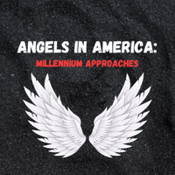
Overview
Synopsis
Angels in America is Tony Kushner’s two-part, seven-hour epic, which he describes as “A Gay Fantasia on National Themes.” In the first part, we meet Louis and Prior and Harper and Joe, two couples whose relationships are on the rocks: the former because of Prior’s AIDS diagnosis and Louis’s inability to cope with illness, the latter because of Joe’s closeted homosexuality and Harper’s incessant fears and hallucinations, as well as her addiction to pain-killers. As we follow these couples’ trials, we come across a handful of other colorful characters, including Roy Cohn, a malevolent, secretly gay Republican lawyer, political power broker, and mentor of Joe’s who is dying of AIDS; Belize, Prior’s ex-lover and a former drag queen who is stuck in the middle of Prior and Louis’s failing relationship; Hannah, Joe’s straight-laced, no-nonsense Mormon mother from Salt Lake, and The Angel, a divine emanation who appears to Prior as a messenger of God to inform him that “The Great Work” is about to begin. Using these characters as mouthpieces, Kushner characteristically dives deeply into political and intellectual themes while generating a vital, living, breathing story, and populating it with characters, both real and fictional, whom we come to both love and abhor.
Show Information
- Book
- Tony Kushner
- Category
- Play
- Age Guidance
- Mature Audiences (M)
- Number of Acts
- 3
- First Produced
- 1993
- Genres
- Drama, Dark Comedy
- Settings
- Contemporary, Fantasy/Imaginary, Simple/No Set
- Time & Place
- New York City, Elsewhere, 1985-1986
- Cast Size
- medium
- Licensor
- Samuel French
- Ideal For
- College/University, Professional Theatre, Regional Theatre, Mostly Male Cast, Includes Adult, Mature Adult Characters, Medium Cast
Context
Angels in America: Millennium Approaches was commissioned and developed by two California Theaters, Los Angeles’ Center Theatre Group at the Mark Taper Forum, where it received its initial workshop in May 1990, and San Francisco’s Eureka Theater, where it was produced the subsequent year. A London production followed shortly thereafter, running for a year at the National Theater. Parts One and Two, Millennium Approaches and Perestroika, opened on Broadway at the Walter
to read the context for Angels in America, Part One: Millennium Approaches and to unlock other amazing theatre resources!Plot
Act One
Rabbi Isidor Chemelwitz of the Bronx Home for Aged Hebrews (played by the same actress playing Hannah Pitt) stands onstage with a small coffin. It is late October, 1985. He delivers a eulogy for Sarah Ironson, Louis’s grandmother, in a heavy Eastern European accent. Sarah, whom he says he did not actually know very well, represents an entire generation of people who “crossed the ocean,” who landed in America, “the melting pot that never melted,” and who struggled “for the family,
to read the plot for Angels in America, Part One: Millennium Approaches and to unlock other amazing theatre resources!Characters
| Name | Part Size | Gender | Vocal Part |
|---|---|---|---|
|
Lead |
Male |
Non-singer |
|
|
Lead |
Male |
Non-singer |
|
|
Lead |
Male |
Non-singer |
|
|
Lead |
Male |
Non-singer |
|
|
Lead |
Female |
Non-singer |
|
|
Hannah Porter Pitt / Rabbi Isidor Chemelwitz / Henry / Ethel Rosenberg |
Supporting |
Female |
Non-singer |
|
Supporting |
Male |
Non-singer |
|
|
The Angel / Emily / Sister Ella Chapter / The Woman in the South Bronx |
Supporting |
Female |
Non-singer |
Songs
A song with an asterisk (*) before the title indicates a dance number; a character listed in a song with an asterisk (*) by the character's name indicates that the character exclusively serves as a dancer in this song, which is sung by other characters.
Monologues
Scenes
Key Terms
A fear of being in situations where escape might be difficult or that help wouldn't be available if things go wrong.
The name used to describe a number of potentially life-threatening infections and illnesses that happen when the body's immune system has been severely damaged by the HIV virus.
A person (typically one more remote than a grandparent) from whom one is descended.
A series of events in a performance or piece of literature that are a dream experienced by one of the characters.
An artistic piece of work composed of a mixture of different forms or styles
An experience involving the apparent perception of something not present.
Dislike of or prejudice against gay people.
A member of the Church of Jesus Christ of Latter-day Saints, a religion founded in the US in 1830 by Joseph Smith Jr.
An award for an achievement in American journalism, literature, or music
The accepted generic term for the LGBTQ+ theatre movement.
Supporting the Republican Party.
A type of scene in which two distinct scenes happen simultaneously on stage.
The language used by Jewish people in central and eastern Europe before the Holocaust. It is still spoken today, mainly in the US, Israel, and Russia.
Videos
Quizzes
Themes, Symbols & Motifs
Sorry! We do not currently have learning modules for this guide.
Quote Analysis
Sorry! We do not currently have learning modules for this guide.
